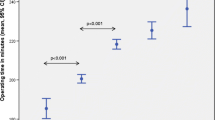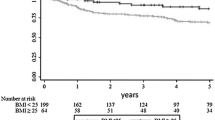Abstract
Background
The influence of body mass index (BMI) on the outcome of patients with colorectal cancer (CRC) is largely unknown, particularly in an Asian population. Therefore, we investigated the influence of BMI on survival of patients who underwent surgical treatment for CRC in Korean population.
Methods
This prospective cohort study included CRC patients who underwent surgery between June 2003 and May 2005. Study participants were divided into two BMI groups: normal weight (<23 kg/m2) and overweight (≥23 kg/m2).
Results
A total of 509 CRC patients were included in this study. Of these, 318 patients (62.5 %) were male, and the mean ± SD age was 59.1 ± 11.3 years. Two hundred eighteen patients (42.8 %) were included in the normal-weight group and 291 (57.2 %) were included in the overweight group. During a follow-up of 62.8 ± 27.2 months, 100 (19.6 %) of the 509 eligible patients died, and 72 (15.0 %) of 479 experienced recurrence. The overall survival of overweight group was more favorable compared with that of the normal-weight group (P = 0.001), while there was no significant difference in recurrence (P = 0.735). Compared with the normal-weight group, the hazard ratios of death and recurrence, respectively, were 0.615 (95 % confidence interval 0.408–925; P = 0.020) and 0.992 (95 % confidence interval 0.613–1.604; P = 0.973) for the overweight group.
Conclusions
Overweight is not associated with an increased risk of cancer recurrence but rather is associated a favorable overall survival in Asian CRC patients undergoing surgery.

Similar content being viewed by others
References
IARC Science Publishers. Cancer incidence in five continents. Vol. 8. Lyon: IARC Science Publishers; 2002.
Edwards BK, Brown ML, Wingo PA, et al. Annual report to the nation on the status of cancer, 1975–2002, featuring population-based trends in cancer treatment. J Natl Cancer Inst. 2005;97:1407–27.
Byeon JS, Yang SK, Kim TI, et al. Colorectal neoplasm in asymptomatic Asians: a prospective multinational multicenter colonoscopy survey. Gastrointest Endosc. 2007;65:1015–22.
Kohler BA, Ward E, McCarthy BJ, et al. Annual report to the nation on the status of cancer, 1975–2007, featuring tumors of the brain and other nervous system. J Natl Cancer Inst. 2011;103:714–36.
Sung JJ, Lau JY, Goh KL, Leung WK. Increasing incidence of colorectal cancer in Asia: implications for screening. Lancet Oncol. 2005;6:871–6.
Sung JJ, Lau JY, Young GP, et al. Asia Pacific consensus recommendations for colorectal cancer screening. Gut. 2008;57:1166–76.
Ahmed RL, Schmitz KH, Anderson KE, Rosamond WD, Folsom AR. The metabolic syndrome and risk of incident colorectal cancer. Cancer. 2006;107:28–36.
Murphy TK, Calle EE, Rodriguez C, Kahn HS, Thun MJ. Body mass index and colon cancer mortality in a large prospective study. Am J Epidemiol. 2000;152:847–54.
Schiel R, Muller UA, Braun A, Stein G, Kath R. Risk of malignancies in patients with insulin-treated diabetes mellitus: results of a population-based trial with 10-year follow-up (JEVIN). Eur J Med Res. 2005;10:339–44.
Lee GE, Park HS, Yun KE, et al. Association between BMI and metabolic syndrome and adenomatous colonic polyps in Korean men. Obesity (Silver Spring). 2008;16:1434–9.
Giovannucci E. Metabolic syndrome, hyperinsulinemia, and colon cancer: a review. Am J Clin Nutr. 2007;86:s836–42.
Campbell PT, Deka A, Jacobs EJ, et al. Prospective study reveals associations between colorectal cancer and type 2 diabetes mellitus or insulin use in men. Gastroenterology. 2010;139:1138–46.
Adams KF, Leitzmann MF, Albanes D, et al. Body mass and colorectal cancer risk in the NIH-AARP cohort. Am J Epidemiol. 2007;166:36–45.
Calle EE, Kaaks R. Overweight, obesity and cancer: epidemiological evidence and proposed mechanisms. Nat Rev Cancer. 2004;4:579–91.
Renehan AG, Tyson M, Egger M, Heller RF, Zwahlen M. Body-mass index and incidence of cancer: a systematic review and meta-analysis of prospective observational studies. Lancet. 2008;371:569–78.
Tartter PI, Slater G, Papatestas AE, Aufses AH Jr. Cholesterol, weight, height, Quetelet’s index, and colon cancer recurrence. J Surg Oncol. 1984;27:232–5.
Meyerhardt JA, Catalano PJ, Haller DG, et al. Influence of body mass index on outcomes and treatment-related toxicity in patients with colon carcinoma. Cancer. 2003;98:484–95.
Haydon AM, Macinnis RJ, English DR, Giles GG. Effect of physical activity and body size on survival after diagnosis with colorectal cancer. Gut. 2006;55:62–7.
Moon HG, Ju YT, Jeong CY, et al. Visceral obesity may affect oncologic outcome in patients with colorectal cancer. Ann Surg Oncol. 2008;15:1918–22.
Physical status: the use and interpretation of anthropometry. Report of a WHO expert committee. World Health Organ Tech Rep Ser. 1995;854:1–452.
Meyerhardt JA, Niedzwiecki D, Hollis D, et al. Impact of body mass index and weight change after treatment on cancer recurrence and survival in patients with stage III colon cancer: findings from Cancer and Leukemia Group B 89803. J Clin Oncol. 2008;26:4109–15.
Simkens LH, Koopman M, Mol L, et al. Influence of body mass index on outcome in advanced colorectal cancer patients receiving chemotherapy with or without targeted therapy. Eur J Cancer. 2011;47:2560–7.
Dignam JJ, Polite BN, Yothers G, et al. Body mass index and outcomes in patients who receive adjuvant chemotherapy for colon cancer. J Natl Cancer Inst. 2006;98:1647–54.
Calle EE, Rodriguez C, Walker-Thurmond K, Thun MJ. Overweight, obesity, and mortality from cancer in a prospectively studied cohort of U.S. adults. N Engl J Med. 2003;348:1625–38.
Munstedt K, Wagner M, Kullmer U, Hackethal A, Franke FE. Influence of body mass index on prognosis in gynecological malignancies. Cancer Causes Control. 2008;19:909–16.
Park SM, Lim MK, Shin SA, Yun YH. Impact of prediagnosis smoking, alcohol, obesity, and insulin resistance on survival in male cancer patients: National Health Insurance Corporation study. J Clin Oncol. 2006;24:5017–24.
Parker AS, Lohse CM, Cheville JC, Thiel DD, Leibovich BC, Blute ML. Greater body mass index is associated with better pathologic features and improved outcome among patients treated surgically for clear cell renal cell carcinoma. Urology. 2006;68:741–6.
Lee CR, Kim YW, Kim NK, et al. The influence of age on survival and recurrence after a curative surgical resection for colon cancer patients. J Korean Soc Coloproctol. 2009;25:401–9.
Moore LL, Bradlee ML, Singer MR, et al. BMI and waist circumference as predictors of lifetime colon cancer risk in Framingham Study adults. Int J Obes Relat Metab Disord. 2004;28:559–67.
Pischon T, Lahmann PH, Boeing H, et al. Body size and risk of colon and rectal cancer in the European Prospective Investigation into Cancer and Nutrition (EPIC). J Natl Cancer Inst. 2006;98:920–31.
Author information
Authors and Affiliations
Corresponding author
Rights and permissions
About this article
Cite this article
Min, Y.W., Kim, SA., Lee, J.H. et al. Overweight is Associated with a Favorable Survival in Patients with Colorectal Cancer: A Prospective Cohort Study in an Asian Population. Ann Surg Oncol 19, 3460–3464 (2012). https://doi.org/10.1245/s10434-012-2436-x
Received:
Published:
Issue Date:
DOI: https://doi.org/10.1245/s10434-012-2436-x




